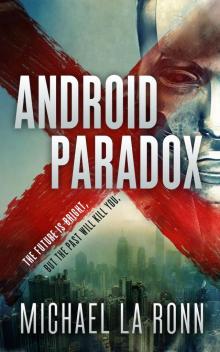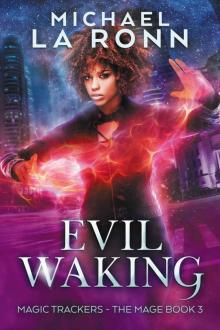- Home
- Michael La Ronn
Android X: The Complete Series Page 16
Android X: The Complete Series Read online
Page 16
A third journalist raised his hand. “Madame, I have a question.”
“Yes?” the Councilwoman asked.
The journalist’s head and arms twitched and he dropped his digital screen. “Why …why …why …” He drew a gun and aimed it at the Councilwoman.
Nobu grabbed the Councilwoman and dove to the ground; X and the rest of the UEA androids pumped the journalist android with hundreds of bullets, destroying him.
X ran to the line of journalists and aimed at them. “Get your hands up!”
The journalist androids, peaceful androids by nature, raised their hands. They got down on their knees as the UEA agents surrounded them. Other android agents surrounded the Council in a protective circle.
Fahrens hurried over to the android journalists and disabled their black boxes immediately. He looked at the dead android journalist and screamed at the top of his lungs, “Who let that android in here without checking him?”
“Sirs and Madames,” Nobu said to the Council, “This press conference is over.”
There was an explosion, and everyone ducked and covered their heads as bits of glass and rubble fell down on the crowd. The people screamed and attempted to run, but UEA tanks at the entrance blocked their path and aimed their cannons at the crowd.
“Several androids in the crowd just self-destructed,” Shortcut said via an audio link. “So much for no rogue androids. You okay, X?”
“I’m fine,” X said as he guarded the Councilwoman from Europe. She stared out at the carnage, mortified.
“What is going on, X?” the Councilwoman asked. “Who reprogrammed the tanks?”
X shook his head. “No time to talk, Madame.”
X and Nobu were ushering the Council off the stage when a loud voice said, “Stop. Don’t go yet! I didn’t get to ask my question!”
An android appeared in the sky, flying on a silver disk shaped like a manhole. He had fiery red hair formed into a triangle on his head that looked like a gnome’s hat, and he wore a blue hoodie. A golden chain with a condor pendant gleamed around his neck. His skin was tanned, as if he had spent too much time in a solarium, and he left a trail of watery exhaust behind him as he flew through the sky. He jumped off the disk and landed in the middle of the platform, shaking it so hard that the Council lost their balance and stumbled down.
“I wouldn’t shoot if I were you,” the android said. “After all, you’ll want to hear what Mama has to say.”
He grabbed the disk and held it up in front of his chest. The bottom of the disk was a digital screen, and it had the logo of the burning condor on it.
“Mama, are you there?” the android asked.
The screen flickered, and soon the burning condor appeared on every screen in the area. X wondered if every screen in the UEA was also broadcasting the message.
Jeanette Crenshaw appeared. The background behind her was black, so X couldn’t tell where she was. Her red eye seemed even redder on camera, and she grinned, waving to the Council.
“Sirs and Madames, I would be remiss if I didn’t interrupt your speech to clarify your points. I’m offended at how you just said my name as if it were a mere fact.”
The way she said “fact” was cold and sharp, and it made the Councilwoman from Europe flinch.
“Listen up, people in the UEA,” Jeanette said. “Your Council lies to you. But then again, that’s all they’ve ever done. I’m here because I want my father’s research. The Council, who has so graciously omitted that fact from their speech, refuses to give it to me. And so every day that I do not get what I want, more people will die.”
The crowd screamed as the tanks fired into it, causing another explosion.
“This isn’t a movie,” Jeanette said. “This is life. More importantly, this is my life, the life that was stolen from me and ruined because of the ‘greater good.’ I won’t rest until I can finish my father’s legacy. It’s what he would have wanted.”
She looked at X as she spoke. “If your Council won’t listen, however, then tell your loved ones how much you love them because they may not be around much longer.”
“Our borders are secure,” the Councilman from North America said. “We will not allow another attack!”
Jeanette shook her head. “You see, my siege on the UEA actually never ended. My wonderful baby, Xadrian, has been inside your city walls since the first attack. And so have the rest of my children. The next round of attacks will begin soon.”
Crenshaw disappeared momentarily and the footage cut to a dozen androids, just as crazily dressed as Xadrian and waving at the camera with guns and swords and grenades.
“They’re among you now,” Jeanette said, reappearing. “If you want to avoid more bloodshed, you know where to find me. Have a blessed day.”
Jeanette laughed her hearty laugh as she disappeared.
Xadrian threw his disk into the air and jumped on it. He balanced himself and then bowed to X. “Sirs, Madames, I’m sorry about that interruption. But will you give Mama what she wants?”
“No,” the Council said simultaneously.
“Then allow me to introduce myself. I’m Xadrian Crenshaw, son of Mama and grandson of Big Papa and Big Mama. I’m going to be your tour guide on this violent day, and all I ask is that you close your eyes and make this easy on me.”
Several machine guns sprouted from the disk and aimed at the Council. Xadrian’s hands turned into flamethrowers and he smirked.
WHACK! SLICE! A piece of rubble hit Xadrian on the side of the head and he fell onto the bulletproof glass, cutting his arm on the edge.
Shortcut stood on the platform, wiping his hands. “You’re the most annoying android ever.”
X and Nobu fired at Xadrian, but he ripped a nearby flagpole out of the ground and swung it, knocking them through the UEA windows and into the cafeteria.
“Just like old times,” Nobu said, helping X up. “Remember the attack formation?”
“Divide and conquer,” X said. They sprinted off in two separate directions. X ran up the escalator and toward the second floor, where he saw Xadrian flying around the area like a sprite on too much caffeine. Nobu burst out of the cafeteria toward the platform, firing at Xadrian as the android skirted around his bullets.
Xadrian grabbed a chunk of rubble and threw it at Nobu, but Nobu shot it out of the air. He fired again at Xadrian, corralling him toward the second floor of the UEA building.
X burst through the glass and landed on Xadrian, and they flew through the sky, punching each other.
“Get off me!”
They slammed into the side of the headquarters and slid down the sloped glass roof of the cafeteria. X grabbed Xadrian’s disk and hurled it at him, striking him in the head. They landed on the grass and bounced several times.
A group of androids surrounded Xadrian and yelled, “Hands up!”
“Ugh.” Xadrian got on his knees and put his hands up, then ZEER! A burning laser shot from his wrists in a circular arc, burning holes in all the android agents. The agents stumbled backward, shocked at the long, linear wounds in their chests.
Xadrian panted. The maneuver had taken most of his energy and he broke into a desperate run.
“You freaks,” Xadrian said, looking back. “You won’t take us down that easily.”
X started after Xadrian but he grabbed his disk, rocketed into the sky and disappeared around a skyscraper.
He heard a groaning sound behind him and turned around to see several agents on the ground, including Nobu.
“I’m okay,” Nobu said as X knelt over him. “It was a superficial wound. Low-powered laser. Never seen anything like that on an android.”
Shortcut ran to Nobu and slid toward him. He pulled out a soldering kit and started to repair Nobu’s chest.
“The Council,” Nobu said. “Are they okay?”
“They’re safe,” Shortcut said.
X stood and surveyed the area. At the back of the lawn, the tanks that Xadrian had commanded were smoldering. The crowd was gone a
nd dozens of people and androids were lying injured or dead on the ground. The area smelled like fire, flesh, and burning silicon.
Shortcut bandaged Nobu as the android medics arrived.
“Nice to work together with you again, X,” Nobu said. “Our creators would have gotten a kick out of us fighting together.”
X nodded and shook Nobu’s hand as the medics carried him away.
“Crenshaw didn’t waste any time, did she?” Shortcut asked.
“How long do you think we have before she begins more attacks?” X asked.
“That’s the problem,” Shortcut said. He held up a digital screen. “They’ve already begun.”
On the digital screen was a map of the UEA. And as X watched, logos of burning condors began appearing, faster and faster until they covered the map.
Chapter 6
In the briefing room, X, Shortcut and Fahrens stood before the Council. The Council hadn’t cleaned up yet from Xadrian’s attack, and they were covered in dust. A digital screen on the wall replayed Jeanette Crenshaw’s speech on one half and the news on the other half. Even at low volume, Jeanette’s voice mixed in with the news anchor’s in a cacophony of gibberish.
X leaned against the wall with his arms folded. The ridges of the mahogany molding left lines in his suit, but he was too focused on the mission at hand to move.
“What Crenshaw said,” the Councilman from North America asked, “is it true?”
Shortcut gulped as he nodded. “We did detect new androids in the city. Crenshaw must have left them during her first attack.”
“But she only attacked the headquarters,” the Councilman from Australia said.
“Remember that her ships were cloaked,” X said. “She probably had another ship that we didn’t see. It’s probably still here, and her gang of androids was probably aboard.”
“The problem is that we can’t track Crenshaw’s androids,” Shortcut said, bringing up a map of the city where several burning condors were blinking.
“Then what are we seeing?” the Councilwoman from Europe asked.
“Android sentries. Pillars around the city. They scan every android that passes and verify their architecture. If they ever find one that doesn’t match the UEA architecture—which is rare—they broadcast a signal to headquarters. So the condors that you see aren’t actual locations; they’re the location of the android sentries. Crenshaw’s androids could be anywhere in the city by now.”
“How often do the sentries send us reports?” the Councilman from Australia asked.
“Every minute,” Shortcut said. “But the further away the android gets, the less helpful the sentries are. And we can’t station agents at the sentries, either, because Crenshaw’s androids will know. If we’re lucky, they don’t know that we at least have a basic way of locating them.”
“We don’t want to lose that advantage,” X said.
“That’s where I come in,” Shortcut said. “I can go to the sentries. Since I’m an engineer, it won’t look weird if I download the data from them. If one of Crenshaw’s androids is around, it won’t trip their suspicions.”
“Smart,” the Councilman from North America said. “The sooner we can disable Crenshaw’s androids, the better.”
Shortcut saluted the Council and grinned. “Give me an hour, and we’ll be able to fight back hard.”
Shortcut sped through the commercial district on a hover cycle, darting between flying cars, skirting around blocks and running red lights. Cars honked and people cursed at him. He focused on his lens, which guided him in the direction of the android sentry.
Two blocks away.
He studied the area and didn’t see anything out of the ordinary. He wondered why one of Crenshaw’s androids would choose the financial district. There was nothing here but buildings upon buildings of profitable companies. If Crenshaw’s motive was economics, that made sense. But nothing really made sense about Crenshaw when he tried to dissect her logic deeply.
The GPS brought him to his destination. He parked on the sidewalk and started to walk. He entered an alley between two buildings, walked down a long, shadowed corridor and emerged into a courtyard. In the middle was a three-foot-tall silver post with rounded edges. A strip of LED lights on a panel ringed the post, and a yellow light revolved around it every few moments, like a beacon on a lighthouse.
Shortcut paused, studied the area with his lens, and confirmed that there were no androids. Just a few people sitting on benches here and there, and a crowd of people lined up in a coffee house across the street.
He knelt before the post and pulled out his digital screen. He keyed in a command, and the post hummed, vibrated and rotated. A door at the bottom opened up, revealing an interface. He pulled out a metal rod, downloaded the sentry’s information, then shut the door and walked away with his hands in his trench coat pockets.
“I’ve got the data,” Shortcut said.
“Nice work,” X said via the audio link. “Didn’t take you long. For once we might actually get the advantage. Any sign of android activity?”
“No,” Shortcut said. He beamed a live feed from his lens to X so he could take a second look. “What do you think?”
He slowly turned around 360 degrees so X could see the whole area.
“Nothing unusual,” X said. “You didn’t need me after all.”
Shortcut grinned. “I told you, if it weren’t for me, you’d be nowhere. Who saved you from Xadrian again?”
X laughed.
“The data should have downloaded to your chips by now,” Shortcut said. “Did you get it?”
“Affirmative,” X said. “I’ve just sent it to headquarters. Good idea making redundant copies of the data before sending it on.”
“Sometimes I swear you forget that I have an android engineering degree,” Shortcut said. “They teach that on the first day, man.”
He passed by a white building with several floors; a sign on the building listed the businesses inside. He passed, then stopped and studied it again.
CIRCUITLAND
THE SILICON OLIVE
THREE BYTES AND A BURGER
THE LAW OFFICE OF GARZA & ROBO GARZA
“Hey, X, go ahead to the headquarters. I’ve got to take care of something.”
“What is it?” X asked.
“Something important.”
“Is it related to the mission?”
“No.”
“You aren’t going to elaborate, are you?”
Shortcut didn’t answer.
“Fine,” X said. “But it won’t take the engineers too long to decode the data and figure out where Crenshaw’s androids are. I’ll cover for you, but I can only stall Fahrens for so long.”
“Appreciate it.”
Shortcut severed the audio link. “I don’t care how long this takes,” he said. “I’ll camp out in this office all night if I have to.”
The building was a swanky new development, wide at the ground floor but growing progressively thinner as it rose. Every odd floor was transparent and you could see inside, and every even floor was made of a different color, so that the place looked like a topsy-turvy sail.
He entered the lobby, a quiet place with a sparse design. Soft lounge music played from the speakers, and several digital screens lined the walls, displaying slideshows of the building’s construction in time lapse.
He came to a directory in the middle of the room—a large screen flanked by ficus trees. He located the law office and then entered an elevator, an elegant car with mirrors on three walls and a golden handrail. The elevator hummed as it ascended to the third floor, and when the doors opened, he entered a law office that was completely different from the one he had seen in the virtual environment.
The office was a loft-style, unfinished with cement floors, a scattering of pillars, exposed brick and pipes along the walls. Can lights hung from the ceiling, and outside was a breathtaking view of the financial district; flying cars zipped by the window and the UEA headq
uarters rose in the distance, surrounded by clouds. A wall of glass separated the reception area from the rest of the law firm, and a staircase led upstairs where Shortcut guessed the attorneys were.
A biracial man sat at the front desk. He was squinting at something on his digital screen, his brow furrowed in concentration. He ran his fingers through his hair and rested his elbows on the table, muttering to himself. He had long curly hair and wore a sweater vest. Above him, a large banner read: THE LAW OFFICE OF GARZA & ROBO GARZA. PROTECTING YOUR INTERESTS SINCE 2199.
Shortcut tugged the pockets of his trench coat as he walked up to the front desk. The man didn’t see him, and kept talking to himself.
“I just don’t get it. These UEA laws are a son of a—”
“Erhm.”
The man saw Shortcut and almost jumped off his stool. He clutched his chest and breathed in deeply. “Jesus, man.”
“Sorry.”
“Why didn’t you say something?”
“I cleared my throat.”
“How can I help you?”
“I’m here for a consultation.”
“What do you need advice for?”
Shortcut eyed the sign above the secretary’s head. “I need to talk about my interests.”
“Can you be more specific, sir?”
“No.”
“We have a few attorneys here who might be able to help you. But they’re not cheap. If you tell me what you need, I can see which one can give you the cheapest rate.”
“I thought consultations were supposed to be free.”
“It depends on what you’re looking for.”
“Okay. Fine. I’m looking for someone to help me draw up an advance medical directive. In case I die, you know?”
“A directive? You don’t have one?”
“Would I be here if I did?”
The man shrugged and typed something into the screen. “Attorney Garza will be with you shortly.”
Shortcut smirked. “Thanks.”
Good. He got Armando. Shortcut imagined the attorney’s surprise when he came down the steps and saw him. He’d have no choice but to usher Shortcut into his office, and they could have a real-life chat this time—no hiding behind some stupid avatars.

 Solar Storm (Galaxy Mavericks Book 5)
Solar Storm (Galaxy Mavericks Book 5) Planet Eaters (Galaxy Mavericks Book 8)
Planet Eaters (Galaxy Mavericks Book 8) Orbital Decay (Galaxy Mavericks Book 7)
Orbital Decay (Galaxy Mavericks Book 7) Honor's Reserve (Galaxy Mavericks Book 1)
Honor's Reserve (Galaxy Mavericks Book 1) Old Evil (The Last Dragon Lord Book 2)
Old Evil (The Last Dragon Lord Book 2) Android Paradox
Android Paradox Evil Waking
Evil Waking Horizon Down (Galaxy Mavericks Book 9)
Horizon Down (Galaxy Mavericks Book 9) Nightmare Stalkers
Nightmare Stalkers Old Wicked (The Last Dragon Lord Book 3)
Old Wicked (The Last Dragon Lord Book 3) Phantom Planet (Galaxy Mavericks Book 2)
Phantom Planet (Galaxy Mavericks Book 2) Garbage Star (Galaxy Mavericks Book 4)
Garbage Star (Galaxy Mavericks Book 4) Android X: The Complete Series
Android X: The Complete Series Festival of Shadows
Festival of Shadows Zero Magnitude (Galaxy Mavericks Book 3)
Zero Magnitude (Galaxy Mavericks Book 3) Rogue Colony (Galaxy Mavericks Book 6)
Rogue Colony (Galaxy Mavericks Book 6) Old Dark (The Last Dragon Lord Book 1)
Old Dark (The Last Dragon Lord Book 1)